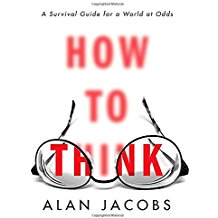Ten years ago, an old friend, now a committed atheist, invited me to participate in an online discussion between atheists and Christians. As rancorous as some of the “discussions” were, I miss the tough back-and-forth probing of my own positions.
At the time, my friend Colleen asked me something to the effect of, “Does it surprise you that I and others don’t believe in God?” My response, which I still hold, is that it is much more of a surprise that people do believe in God in our culture. We have created a whole set of habits that leave no room for God. I was thinking at the time about the privatization of belief, but I’d like to take another angle on the same question. God is not a credible concept in our culture because we are living through a crisis of symbolism. I borrow this phrase from another friend (some implied strong language in the linked blog post).

I’ll opt for the cliche and blame Descartes for the schizophrenia of modern philosophy.
What do I mean by this? We don’t understand the implications of symbols and metaphors because we are frequently unaware that we use them. When we speak metaphorically, we use one image or idea to stand for another. We do this because some ideas are only available to our minds via symbolic representation. By contrast, “univocal” speech, promoted by the fourteenth-century nominalists and fixed in our public discourse by seventeenth- and eighteenth-century rationalists, aims at a one-to-one correspondence between a word and an object. Non-material objects, in Descartes’s telling, must therefore be “clear and distinct.”
But lots of worthwhile ideas are unclear and indistinct. Let’s take the idea of the “self.” During those old debates, one frequent objection that atheists made to my beliefs was that if God exists, He must be able to communicate Himself to us clearly and distinctly. I would point out that we can’t even communicate ourselves to ourselves clearly and distinctly most of the time, if ever. The more I grow in self-knowledge, the more mysterious I am to myself, and the more mysterious (and glorious) others appear to me. It’s not that we can’t know God; but all of our language about God is analogical and not univocal. We can only speak properly about God by analogy (as we do about our “selves!”). When we say that God is good or even that God exists, we don’t mean this in the same way as we might mean, “This ice cream cone is good,” or “The city of Paris exists.” So we use these terms “good” and “exist” to mean something other than what they commonly mean in clear and distinct speech.
Similarly, we use metaphors all the time. But as Alan Jacobs and many others have pointed out, we often lose sight of them and mistake them for univocal speech. We speak of a “War on Terror,” or a “War on Drugs,” unthinkingly, as if this manner of speaking was clear. Our failure to keep in mind that these are metaphors means, ironically, that our thinking about terrorism and drug dealing and abuse are, in fact, contorted. There might be better metaphors available (as Portugal suggested by decriminalizing drugs).
When I preach retreats, I usually begin by quoting Saint John Cassian, “We practice the frequent reading of and constant meditation on Scripture, so that we may be open to a spiritual point of view [Conf. 14.X].” I do this because even monks lose sight of the fact that a “spiritual point of view” is necessary. Things are not what they immediate seem. Created objects and artifacts–including words–open onto other realms, if we are alive to this fact. In the strongest example of this, created objects and artifacts become sacraments. Common bread and wine become, in the gaze of the spiritual woman or man, the Body and Blood of the Son of God.
A spiritual point of view requires that we learn how to read spiritually. Here is another noteworthy feature of the atheist-Christian exchanges: almost no one in the discussions knew how to read the Bible like a poem or a love letter. All meaning had to be more or less literal, univocal.
When I teach Evagrius to novices and others, the main stumbling block to learning his beautiful system of spiritual maturation is the idea of “natural contemplation.” This means looking at the creatures of the world and seeing in them God’s loving purposes, His wondrous designs, His fond presence. Without this, contemplation becomes something apart from the world, a private set of meanings rather than shared symbols.
Why is art, even sacred art, so impoverished today? Do our contemporaries delight in poetry or fall in love? I can’t help wondering if the recent news of so many celebrity suicides isn’t related to the oppressively claustrophobic world we’ve settled for, the zero-sum, dumb cosmos of flat matter, severed from the spiritual realities that bring hope and joy.

T.S. Eliot: Don’t ask what a poem means [in other words, don’t seek a univocal explanation]; ask what it is.
Thanks to the Enlightened emphasis of the past 200 years, particularly in academia, on “science, reason, and humanism,” we have utterly lost the capacity to think in metaphor and analogy—the ground on which much religious thinking depends. This, of course, is why Jordan Peterson’s lectures have captured so much attention. It is also the reason, as I keep saying, that I wish he would read my book.
It isn’t the Logos that we have forgotten. It is the Lady—and with her, the real reason that art is so threatening: because…it points us to God.
–Rachel Brown, aka “Fencing Bear”